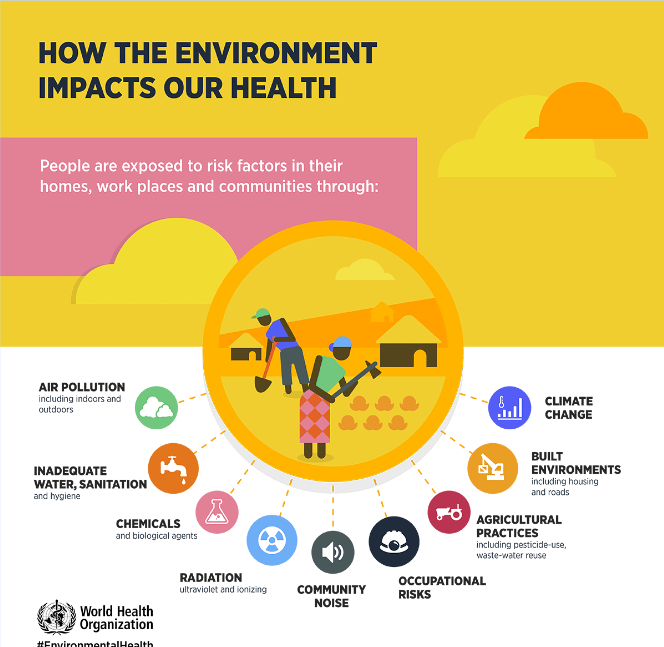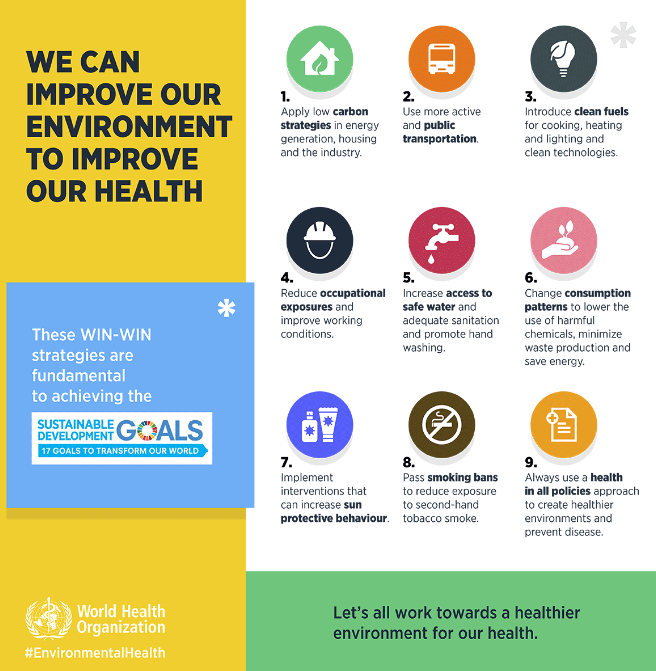Health ED test
1/39
There's no tags or description
Looks like no tags are added yet.
Name | Mastery | Learn | Test | Matching | Spaced | Call with Kai |
|---|
No analytics yet
Send a link to your students to track their progress
40 Terms
How does the environment affect your health?
Why do different people experience the environment in different ways?
Does the time of the day or the people you are with affect the experience of the environment?
Is there any dangers in your own environment?
What kind of environments there are?
The environment affects your Health in many differents ways, this could be from the weather you experience, the food you eat, your interactions and much more.
Many people are from many parts the world and live in very different environments. For example people living in Finland would have different environments than people living in India.
It can. In Finland during the winter time you don’t get much sunlight, which can make changes in your mood and also your feelings throughout your day.
Dust, noise, smog, second hand smoking.
There are many different environments, tropical, noisy, dusty, clean, etc.
Environmental health is one part of health. Environmental health (science) researches how the environment:
Supports health
Affects the disease development
Can support health and prevent the negative effects.
how the environment affects my:
Physical health
Social health
Mental health
Environments that are hot, or cold for example. Times when it’s hot can cause headaches and such.
Crime and safety, peoples interactions, noise, etc.
Maybe Environments that are more peaceful and calm (like the forest) can be better for your mind. - Environemnts that are noisy and are polluted can cause stress and difficulty to concentrate
How Environment impacts our health:

Direct environmental factors
measurable (noise, radiation or pollution).
They cause noticeable physical symptoms.
INDIRECT ENVIRONMENTAL FACTORS
Environment that can make you feel differently. Fear, relaxation, bring back good memories, trauma.
Are individual and hard to measure. Indirect.
- Example: Someone who almost drowned in the sea may feel different from a person who is able to swim and loves being in water.
Describe a environment that makes me
Relax
Depressed
Want to hang out with your friends
Move (physically active)
The Beach, Forest
A graveyard
The mall, school.
A playground, Gym.
Ways to improve Environments to our health

What is environmental health?
A person has the right to breathe, eat, drink, move and exercise so that his health is not threatened.
The environment always affects human health and safety in some way, either supporting it or undermining it
Society takes care of the health and safety of the environment by, among other things, enacting environmental laws, monitoring the state of the environment, informing about dangers and building comfortable residential areas and safe traffic routes.
Every human has the right to take care of their environmental health that requires Skills and knowledge
Different type of environments
Virtual: Doesn’t really exist. Social Media, Chatting etc.
Person texting a friend who they don’t know
Pyschological and Social environment: What kind of feelings a place may bring you. (Apartment Vs Home)
Symbolic Environment: Environment that symbolizes something for a person. Slang, culture, relatives.
The health effects of direct environmental factors
clearly observable symptoms or even diseases
Direct Factors: air quality, purity of food and water,sound volume, and the quality and quantity of radiation
depends on the intensity of the exposure, the time of exposure (Heredetary exposure in some cases)
Despite individual differences, limit values can be set for many direct environmental factors
The health effects of indirect environmental factors
Different for Individuals
Environments can make you feel differently per preson. Relaxed or fear.
Walking outside in the dark vs in the light.
Internet is used for:
Research for information
Study
Taking care of personal matters
Interact in social media
Use it for entertainment
Pros and Cons for Virtual environment
PROS:
- Accessible information
- Entertainment
- Communication
- Work/occupations
CONS:
Bullying online
Grooming
Theft of personal data
Streetwise in the internet
Knowing the Do’s and Donts of the internet
Being private and not giving info. (Bank info, location, etc.)
Don’t go with people you don’t know
If somethings too good to be true. It ain’t true
What to do when cyberbullying
Don’t answer the messages
Find out how you can block the user
Save the messages for later evidence
Tell someone you can trust
Talk to your parents straight away
Contact the admin of the website/app
Let the police know.
Emotins of Social media
Can make your day happier by watching a funny or a cool video
One might think their life is boring compared to looking at someone who posts fun stuff on social media. (Boring parts are never shown)
Communities form through platforms, interactions, games. give social support and virtual presence.
Dissidents are considered a threat to the group. Remember to stop and think if their thoughts are correct.

Grooming/Pedophilia
Pedophilia: Disease and interest in minors. Internet makes it easy to be a pedo.
Try to overcome the victim by gaining their trust. Try to make them complete the Pedos desires
Preperation Sexual abuse is Grooming
How good air quality do you have in your everyday environments?
Where is it good?
Where is it poor?
Finland has good air quality compared to third world countries
Forests, more nature concentrated areas
Cities, with overcrowding, noise, construction, dust, smog.
Affects of Air quality inside
Smoking
Second hand smoke
Dusty, dry or too warm air
Headache, fatigue, stinging eyes or blocked nose
Proper ventilation, cleaning and regulating the temperature
Radon
Oderless and colorless, hard to recognize and increases risk of lung cancer
Mold
Caused by Water damages, frequent exposure to water, structural mistakes
Symptoms are individual
Hard to find and takes a lot of energy, resources, and money to fix.
Outdoor affects of air quality
Smog = Smoke + fog
Traffic pollution + street dust + burning coal + industry pollution
Makes a huge cloud over the city and cause stinging in eyes and respitory diseases
The smaller the particles are, more dangerous they are - Harder to recognize and can enter our body easilyParticles floating in the layer and ozone gas can easily get into your body and irittate mucous membraines in your lung
Breathing clean air
Human breathes 15 thousand liters of air.
Impurities and unclean air enters body everyday
Air must be clean to be healthy
The most sensitive to air pollution are children, the elderly, asthmatics and people with cardiovascular diseases.
Air affecting Indoors
Indoor smoking can cause people to be victims of secondary smoking
Radon can build up under homes and long time exposures can cause health problems
Why has the water turned to ”green porridge” in ponds or lakes?
What if drinking water has gone bad?
What if there is poisons in your food?
Why small pike is more healthier to eat than a big pike?
Because of the concentration of Algae in the water
Then the water will be contaminated with diseases and bacteria that can harm your body
It will harm you and make you sick. (Common sense)
Big pike is bigger hence it consumes more things which can have contaminated substances,bacteria and diseases
BLUE-GREEN ALGA
is poisonous bacteria that floats usually in lakes or ponds. Eutrophication mainly being the cause
In this case it is forbidden to swim
Water is not good to use for bathing or for sauna
Might lead to stinging skin or eyes, cause damage to liver and the nerve system
Usual symptoms are rash, headache, stomach problems such nausea and diarrhea.
CLEAN DRINKING WATER
Finland has Comprehensive Sewage system. Which gives clean water that is filtered, cleaned and the water quality being monitored
Every sixth person in the world has to use dirty water for drinking and bathing.
Third world countries have insufficient lavatories which cause bacteria and viruses to spread.
Food form start to finish
Grocery chain = Food products journey from start to finish.
→ Finnish food authority (EVIRA) = Finnish food authority which monitors and researches food production.
Customs laboratory = Monitors the groceries imported to Finland
Because of the strict control Finland has good quality on groceries.
Cooking safely
Common diseases caused by environment is food poisoning. By Bacteria or virus in water or food.
Factors causing food poisoning:
Expired food
Unclean food
Food not properly prepared
Food that has bacteria/diseases
Food poisoning most common in Finland is norovirus. Other places its salmonella
How can you avoid food poisoning while on holiday in a foreign country?
Making sure that the place you’re eating is a clean place and that is kept clean and they have proven to be a place that makes good and clean food.
What kind radiation can be easily detected?
What kind of radiation is necessary for us?
What kind of radiation is dangerous?
What kind of radiation do you enjoy? What do you fear?
What radiation can be used to help people?
Radiation from sun for example, UV rays, heat, sound
UV rays to some extend, heat.
Exessive UV rays can be harmful and can higher risk of skincancer
Sound → Music. Radon → Odorless, colorless.
Radiation Therapy, X-Ray machines.
The Sun Positive affects
Boosts your mood!
Relaxes
Makes waking up in the morning easier
Decreases tiredness and need of sleep
Cells produce D-vitamin and skin nursing fats
The sun Negative affects
Headache, nausea and dehydration
Burned skin (increases skin cancer risk if frequent)
UV-radiation
Sensitive eyes (long-term boosts development of cataract = Harmaakaihi)
Sunstroke due overheated head
Heatstroke due excessive sweating (dehydration)
Radioactive radiation
Very dangerous. Increases risk of Cancer and Infertility
The Finnish Radiation and Nuclear Safety Authority monitors nuclear powerplants and levels in Finland
We are all exposed to Cosmic background, but not very dangerous
Radon gas comes from Soil and bedrock
Odorless and colorless.
X-RAYs
Is it dangerous?
What precautions are used?
What is it used for?
How does it work?
What kind of sounds make you relaxed?
What kind of sounds are noise?
How can you protect yourself from noise?
What is hearing damage?
Calmful sounds, music, sound of nature.
Yelling, Too loud music, sound of machines, etc.
Putting on earmuffs, lowering down volume, going somewhere quiet
Is permenant damage caused by too much loud noise throuhgout a long period of time.
What is noise?
Any kind of sound that feels unpleasant or affect your health negatively.
Measured in Decibels
Noise damage
Volume (dB) | Time limit |
85 | 8h |
90 | 2,5h |
95 | 48 min |
100 | 16 min |
105 | 5 min |
110 | 1 min |
115 | 30s |
How noise Affects your health
Damage is permenent
Damage depends on time and volume spent in the environment.
Tinnitus = Buzzing sound when ears have gone trhough noise damage
Noise damage is most occupational disease in Finland
concentration decreases performance and increases the risk of an accident.
C ontinuous noise decreases comfort, increases stress and causes insomnia. Can happen without you noticing it.
Protection from NOISE
Reducing the volume while listening music (phone, headphones etc..)
Reducing the time spent in the noise
Use Ear protectors if noise cannot be controlled
Society is trying to reduce noise to create a comfortable and safe environment.
Sound barriers
Sound regulations